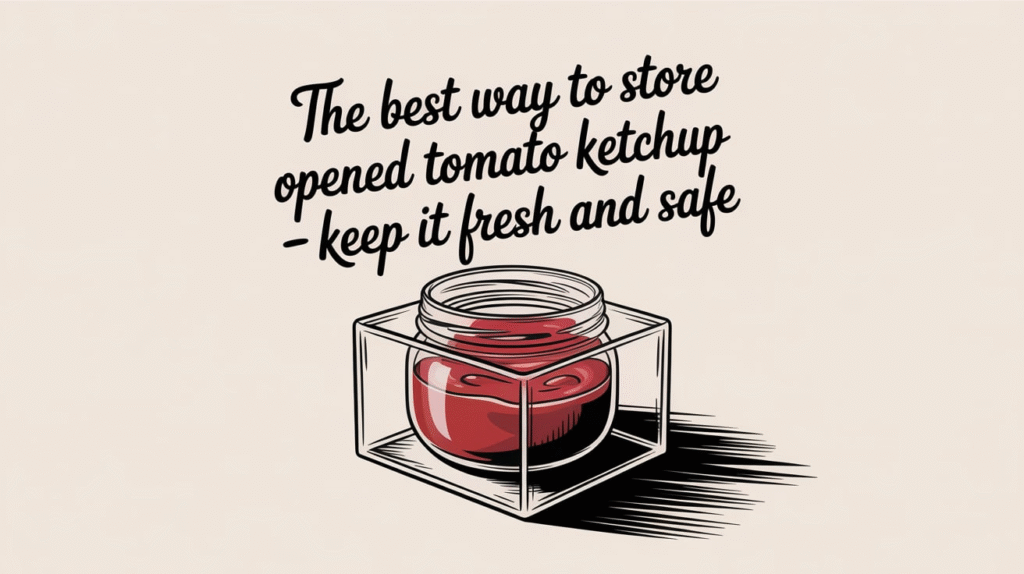Affiliate Disclosure: PantryBrands.co.uk is a participant in the Amazon.co.uk Associates Programme. As an Amazon Associate, we earn from qualifying purchases made through links on this site.
Once opened, tomato ketchup should be stored in the refrigerator to maintain freshness, flavour, and safety. While many people leave ketchup out at room temperature, refrigeration slows spoilage and helps preserve its taste over time.

In this guide, we’ll explain the best practices for storing opened tomato ketchup, how long it lasts, what signs to look for if it spoils, and how storage impacts both homemade and commercial varieties.
Should You Refrigerate Opened Ketchup?
Yes, opened tomato ketchup should always be stored in the fridge. While the vinegar and sugar give it some natural preservative properties, once opened, the risk of spoilage increases due to exposure to air and bacteria.
Why Refrigeration Matters
Keeping ketchup chilled helps extend its shelf life:
- Prevents bacterial growth by keeping it at a safe, low temperature.
- Preserves flavour by slowing down oxidation and ingredient breakdown.
- Maintains texture and consistency, especially for high-tomato-content brands.
Even though some restaurants keep ketchup at room temperature, that’s due to high turnover — at home, where use is less frequent, refrigeration is essential.
How Long Does Opened Ketchup Last?
The shelf life of ketchup depends on whether it’s homemade or store-bought, how you use it, as well as how it’s stored.
Shelf Life in the Refrigerator
Once opened and refrigerated:
- Store-bought ketchup (like Heinz): lasts up to 6 months in the fridge.
- Homemade ketchup: best used within 2 to 3 weeks, since it lacks preservatives.
Always refer to the “Best Before” or “Use By” date, and check the bottle for storage guidance.
Shelf Life at Room Temperature
If left unrefrigerated:
- Ketchup is safe at room temperature for about 1 month, but flavour and quality degrade faster.
- Spoilage risk increases in warmer climates or poorly sealed containers.
For maximum safety and quality, refrigeration remains the better option.
Best Storage Practices for Opened Ketchup
Proper storage goes beyond just placing the bottle in the fridge. It involves cleanliness, temperature control, and avoiding contamination.
Tips for Storing Ketchup After Opening
Follow these basic tips to get the most from your ketchup:
- Seal the cap tightly after each use to prevent air and bacteria from entering.
- Store in the main fridge compartment, not the door, where temperature fluctuates.
- Avoid dipping food directly into the bottle to prevent cross-contamination.
- Wipe the bottle opening clean if ketchup builds up, as dried residue can host bacteria.
These small habits help extend the usable life of your condiment and keep it safe for consumption.
Storage Differences Between Homemade and Commercial Ketchup
Homemade and store-bought ketchups require different storage approaches due to their ingredients and preservative content.
How to Store Homemade Ketchup
Because homemade ketchup typically lacks chemical preservatives:
- Always store in a clean, sterilised glass jar or bottle.
- Keep it refrigerated at all times.
- Consume within 2 to 3 weeks.
- If freezing, divide into small airtight containers to preserve quality and avoid freezer burn.
How to Store Commercial Ketchup
Commercial ketchup contains stabilisers and acids that prolong shelf life, but it still needs refrigeration after opening.
- Plastic squeeze bottles should be kept upright in the fridge.
- Glass bottles should also be kept chilled and resealed tightly.
If the label says “Refrigerate after opening,” always follow it.
Signs Your Ketchup Has Gone Bad
Even with refrigeration, opened ketchup can eventually spoil. Knowing the signs helps you avoid consuming unsafe food.
How to Tell If Ketchup Is No Longer Safe
Watch for these common spoilage indicators:
- Off smell – a sour, fermented, or musty odour
- Discolouration – darker or brownish hue may indicate oxidation
- Texture changes – unusually runny or clumpy consistency
- Gas build-up – bloated bottle or fizzing sound when opened
- Mould – visible spots inside or around the cap
When in doubt, throw it out. Ketchup is inexpensive — it’s not worth the risk of foodborne illness.
FAQs About Storing Opened Tomato Ketchup
Here are some questions and answers about storing ketchup after it’s been opened.
Do I have to refrigerate ketchup after opening?
Yes. While it can stay at room temperature for a short time, refrigeration after opening significantly extends shelf life and maintains flavour.
How long does opened ketchup last in the fridge?
Store-bought ketchup can last up to 6 months in the fridge if stored properly. Homemade versions usually last 2–3 weeks.
Can ketchup go bad even if refrigerated?
Yes. Over time, ketchup can spoil due to contamination, oxidation, or poor storage habits. Always check for signs like foul smell or unusual texture.
Can I freeze ketchup?
Yes, you can freeze ketchup, especially homemade kinds. Use freezer-safe containers and divide into small portions. However, texture may change slightly upon thawing.
Is it safe to eat ketchup left out overnight?
If ketchup was left out for just a few hours, it’s likely safe — especially if it was sealed. However, prolonged exposure at room temperature can reduce quality and increase spoilage risk.
